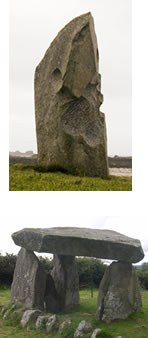Yesterday I discovered that there are quite a few different words for handle in French, depending on what kind of handle you’re referring to:
– poignée /pwa.ɲe/ is a door handle or the handle on the lid of something. It also means handful, as in une poignée de sel (a handful of salt) or Ils n’étaient qu’une poignée (There were only a handful of them). In can also refer to love handles (poignée d’amour) and a break handle (poignée de frein). [source]. It comes from poing /pwɛ̃/ (fist), from the Latin pugnus (fist) [source].
– anse /ɑ̃s/ is the handle of a cup, or a cove, and comes from the Latin ansa (handle, tiller).
The Welsh equivalents are dolen (bow, handle, link, loop, ear, noose) and trontol (handle).
– manche /mɑ̃ʃ/ is the handle of a tool or a saucepan, and also a sleeve, or neck (of a violin or guitar).
The Welsh equivalents are coes (leg, stalk, handle) and carn (hoof, hilt, handle).
– queue /kø/ = is the handle of a frying pan, and also a tail, stalk and queue (line of people). It comes from the Latin word coda, a variant of cauda (tail) [source].
Are handles metaphorically linked to the same words in other languages?
